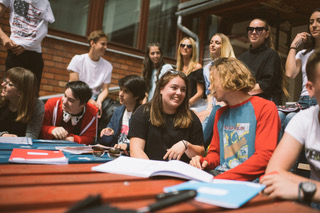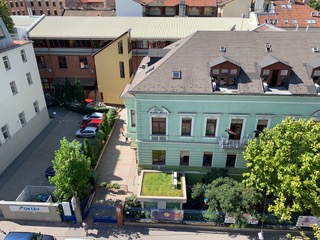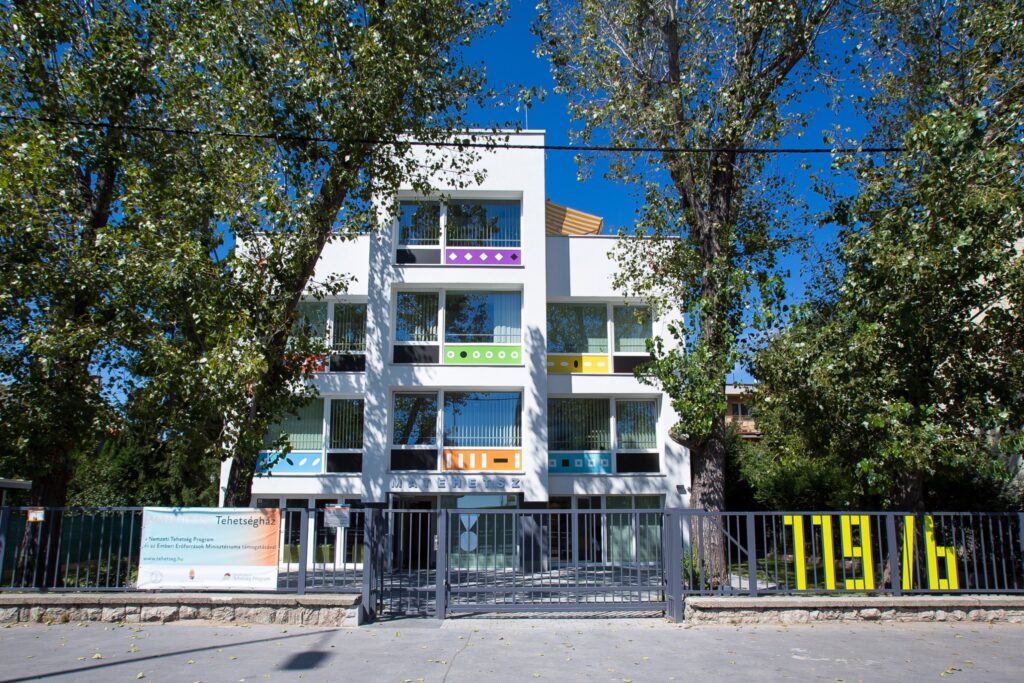Information
Dear Participants,
here you can download the Book of Abstracts.
Dear Participants,
let me answer those questions you asked either in e-mail or through the Q and A platform:
- in case the presenters agree we will upload their ppts on the website (Prof. Márta Fülöp has already agreed)
- quite a number of questions to Márta Fülöp arrived after she had finished talking, she did not have time to answer them, so we decided that Prof. Márta Fülöp will be in the program again, she will log in live and will answer the questions on Friday ( on the 26th) right after the last presentation
- in some cases the presentations were too quite – it is different with us – I am very sorry about this – looks like the problem is at the computer you are listening to
- please, follow the program on the website we constantly update it with the exact timing
- please if you have problems with joining (fortunately, there were only very few) follow the instructions we sent previously: Joining the teams
- please always be careful which link you use, naturally always „the next” link will be valid; today: the morning one you find under this date: 2021.03.24. AM and than comes the afternoon one etc.
Enjoy the conference,
Csilla & Szilvi
Dear Participants,
What does the ECHA Conference Week mean in practice?
Each day, registered attendants can watch a compilation of lectures, shorter presentations, roundtable discussions etc. lasting for approximately 3 hours from 4:00 PM (CET / Budapest time). This compilation is then repeated the next morning at 10:00 AM (CET).
The Thematic Conference begins on 23 March at 4:00 PM (CET) and ends on 28 March with the morning presentations starting at 10:00 AM (CET). After the keynote lectures you can ask questions from the speakers on the platform (Q&A part).
Be careful: 4 PM in Budapest means very different times all over the world. Please check it, before you join!
The conference will be on-line. Participation at the conference week will be free of charge to all, but preliminary registration is required.
Dear Visitor,
Thanks for visiting us and for your interest in our Conference.
The Association of Hungarian Talent Support Organisations (Matehetsz) together with the University of Debrecen, Hungary organises the international 2nd Thematic ECHA Conference online in March 2021.
We chose ’Closing the achievement gap’ as the topic of the Conference, because the persistent disparity in academic performance or educational attainment between different groups of students is a topical issue in gifted education. The achievement gap is an issue closely related to the concept of equity, fairness in education, equal access to learning opportunities and greater equality in educational achievement, attainment and benefits, which are key goals of a caring talent support system.
Our everyday life abounds in online meetings and conferences due to the restrictions imposed because of the pandemic. The original plan was to receive and host you in Budapest, but the Conference had to be converted into an online event due to the change of circumstances. We thought the practical solution would be to extend the 1.5-2-day thematic conference to a whole week, with opportunities to join it twice a day, at 10:00 a.m. and 16:00 p.m. CET. The presentations of each day will be repeated in the morning of the following day to provide comfortable access to people all over the world. Consequently, the Conference will last for an unusual six days, from 23 to 28 March 2021, so it will actually be a so-called ECHA Thematic Week.
During this week we would listen to leading researchers, keynote and invited speakers like Márta Fülöp (Hungarian Academy of Sciences), Frank C. Worrell (Berkeley, CA), Paula Olszewski-Kubilius (Northwestern University), Jonathan Plucker (Johns Hopkins University) and Tibor Péter Nagy (Hungarian Academy of Sciences) speaking about our topic.
We believe that measures induced by fighting COVID-19 have made tackling the underprivileged situation more topical than ever. School shutdowns can deprive students of the opportunity to get the education they need to build a brighter future, and they are likely to compound disparities in learning and achievement. In addition, underprivileged students are more likely to remain remote and less likely to have access to the prerequisites of learning such as electronic devices, internet access and live contact with teachers. Left unaddressed, these opportunity gaps would translate into even wider achievement gaps.
In view of the global economic challenges and in line with our conference topic, participation at the Conference Week will be free of charge to all, but preliminary registration is required. ECHA members registered to the conference will later be provided access to all presentations for 6 more months.
Please register to the conference here.
You can register to be an ECHA member here.
About the Host Associations
Magyar Tehetségsegítő Szervezetek Szövetsége – Association of Hungarian Talent Support Organisations (Matehetsz):
Matehetsz non profit association was founded 12 years ago to provide a permanent opportunity for Hungarian organisations at home and across the borders active in talent support to consult on and harmonise their stances on talent support and to promote and shape the further development of the Hungarian talent support system by studying domestic and international examples, organising professional fora, obtaining financial support, considering new forms of support and announcing tenders. Websites: www.tehetseg.hu, https://talentcentrebudapest.eu/
National Talent Point and European Talent Support in Budapest operate within the framework of Matehetsz. Matehetsz was responsible in the past 10 years for the implementation of several EU, domestic or other tenders of national relevance: Hungarian Genius Project, Talent Bridges Project, Templeton Project, Hungary of Talents Project.
Under these projects, it published 41 books on talent and talent development. It has called to life a talent support network in the Carpathian Basin consisting already of almost 1500 so-called talent Points, and it has supported the operation of their Network in various forms for 10 years. The ongoing talent support training courses developed by Matehetsz were attended by almost 25 000 teachers in the past years and ten thousands of children were provided support during the years in various forms, from scholarship to training.
In addition to its many activities, Matehetsz has organised 23 talent support conferences, including 3 international ones of several days, the rest being typically one-day, on a few occasions 2-day, domestic conferences, Since its foundation in 2008. Talent nurturing to disadvantaged children was one of the foci of its conference organised at Szeged University in 2014. Matehetsz conferences were typically attended by 250 to 300 persons, but on some occasions the number of participants reached 450.
University of Debrecen:
The University of Debrecen is more than 450 years old; it is Hungary’s oldest higher education institution operated continuously in the same city and as one of the largest educational centers of the country; it is a central player in Hungarian higher education. It has outstanding educational, research, and innovation capacities in international comparison as well and, based on these, it plays a major role in the realization of objectives of the national strategy. It is also one of the top 500 universities in the world. The student community of 30,000 can study in 14 faculties, in institutions of excellent scholarly standard. As a leading university, it is known in Hungary as an intellectual center providing the widest spectrum of educational programs while also closely cooperating with the private sector, the business sphere and the local government.
 University of Debrecen
University of Debrecen
The university has been an excellent partner for the city of Debrecen from the very beginning and it is one of the main driving forces behind the city’s development. Besides the performance of its basic functions and duties at the highest standard and quality, we are dedicated to playing an active role in the development of the economy in the Northern Great Plain Region of Hungary and acting as a service provider for innovation by companies of the region, primarily in the health industry, biotechnology, agriculture, and technology.
Department of Educational Psychology
Within the university, the activity of the Department is highly diversified a mix with psychology courses for the teacher-training programs, teaching BA and MA psychology students and in particular developmental psychology and courses of relevance for talent support and school psychology representing one stream. In addition to BA and MA education, they take part in PhD training and the postgraduate “Talent nurturing, talent development” program designed for teachers. Those at the Department published many textbooks, lecture notes and scientific publications mainly in the fields of talent nurturing, personality development, career orientation and developmental psychology, and they are continuously present at the domestic and international conferences. In addition to education and research, they are committed also to practice, i.e. sports psychology, career guidance, talent identification and talent counselling, and child psychologist colleagues cover also the teaching and treatment of psychic problems manifesting themselves in childhood and adolescence. The Department has strong professional ties with several other departments and other units of the University (Department of Pedagogy, Teacher Training Centre, Centre for Student Relations and Services, Sports Science Coordination Institute, teacher training schools), other prominent university workshops (e.g. ELTE) an other research sites (e.g. HAS), and also with high-profile civil organisations such as Matehetsz or the Association of Teacher Education.
In 2000, the Department organised the ECHA (European Council for High Ability) with the participation of around 500 foreign and domestic professionals, and the 1st Itinerant Conference of School Psychologists has also been organised here recently.
Matehetsz – University of Debrecen cooperation:
In the past 12 years, the Pedagogical Psychology Department of Debrecen University contributed to the implementation of all significant application-based EU or domestic talent support projects (Hungarian Genius Project, European talent Centre of Budapest, Talent Bridges Project, Templeton Project, Hungary of talents Project) through diverse activities: education, development of training materials, counselling, project management, book-writing, trainer work etc. Time-tested smooth cooperation between these two institutions over 10 years guarantees the success the conference.
Brief introduction of Europe 2000 High School
The Europe 2000 Grammar School in Budapest has been a foundation-maintained institution operating for 29 years.
According to the mission of the school, it adapts flexibly to the challenges of the 21st century, provides students with spiritual-moral-physical development in a familiar environment. Our goal is to educate citizens with a healthy identity, accepting others, open to the world and with European values. In order to develop students’ talents, modern material conditions and a well-trained, continuously evolving faculty help to transfer the knowledge applied to students’ level of development and to acquire the knowledge necessary for graduation and further education, and to develop skills adapting to modern labor market needs. The organization of extracurricular cultural, sports and other entertainment programs ensures that student life is made an experience. In order to nurture talent, we teach mathematics, history, foreign language, hungarian language and literature, competence development subjects, and special subjects in film and media, and international business in groups grouped according to the abilities of the students. Our institution also has a bilingual department.

Students

Europe 2000 Grammar School
In 2015, we won the Accredited Outstanding Talent Point title. We implement 3-4 talent development tenders in different talent areas per year. These projects help students to test themselves in different areas of talent, and help colleagues identify gifted students in each area.
In addition to education, we consider it very important to develop the personality of our students. To this end, we have introduced the “7 Habits of Successful Young People” life management program.
In addition to personality development, we pay special attention to the safety and well-being of our children, in which the “Nemecsek Program” provides assistance.
Our title of “European Parliament Ambassador School” in 2019 obliges us to introduce our young people to the workings and values of the EU.
Our institution is committed to modern digital education. Our goal is to radically transform the educational process to meet the challenges of the 21st century. Thanks to our two years of preparatory work, our institution has been one of the Microsoft Showcase School practice schools since September 2020.
In addition to domestic tenders and projects, we also participate in several international projects, such as: ERASMUS + KA1, ERASMUS + KA2 projects.
We are open and looking for opportunities for both students and educators to share our experiences in an international environment, to adopt new good practices that can help us develop our students’ skills as effectively as possible.

